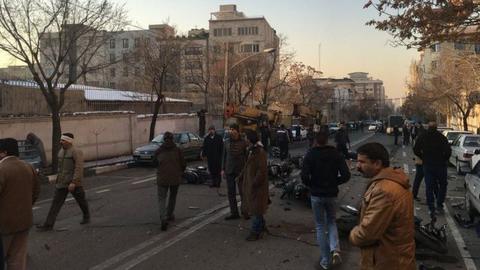Mohammad Sharifi-Moghaddam, a student activist and Gonabadi dervish imprisoned in Greater Tehran Prison, has appealed to publishers and translators to send books to prisoners.
In a letter seen by IranWire, Sharifi-Moghaddam describes conditions in the prison, which is also known as Fashafuyeh Prison, including the human rights violations that regularly take place there. Given the restrictions in the prison, he says, he is calling on publishers and translators to do something positive and provide prisoners with books. He says that books, and in particular, novels, can provide inmates with a welcome escape from the four walls that surround them and help them endure the harsh environment.
Sharifi-Moghaddam was arrested following clashes between police and Gonabadi dervishes in Tehran’s Golestan-e Haftom Street in March 2018. He was sentenced to 12 years in prison on a range of charges including "propaganda against the regime" and "acting against national security.”
The text of Sharifi-Moghaddam's letter follows.
***
Dear authors, translators and friends,
Hello.
I have been serving my sentence in the Greater Tehran Prison for several years, and for the last year I have been in the general ward of the prison, albeit in a safe cell separate from the others [inmates held on charges other than political ones, including violent crimes].
I would like to tell you briefly about Greater Tehran Prison (Fashafuyeh). This prison has accommodated more than 18,000 prisoners across five prison complexes. Detained activists have repeatedly written about prison conditions here: lack of drinking water, poor nutrition, overcrowded populations, strife, addiction, overdose, self-harm, suicide, rape and intensified exploitation, etc. are all issues that prisoners deal with.
In this letter I do not want to write about the conditions in Fashafuyeh. I and will leave you to find out about the living conditions in the prison by searching published texts and enquiring of newly-released prisoners. I will only say that what is happening in Fashafuyeh Prison is a violation of human rights and not a criminal punishment, let alone a place that could help someone prepare to return to society!
In each prison section, which has about 4,000 inmates, there is a place called a cultural office that operates four hours a day. Each ward can send five people to the office for one hour a week. A room in the cultural office is reserved for the library: several bookshelves, at least half or more of which are duplicate "religious" books or "Memoirs of the eight-year war” type books. Although some of them have reached their 70th edition, at least a few of them are buried in the corner of the prison’s cultural office.
Each of the five people can borrow a book. Contrary to the regulations of the Prisons Organization, newspapers, journals and magazines are not provided to prisoners, and contrary to the same regulations, books posted to prisoners are sent back. Therefore, books are a very rare commodity in prison, while materials such as “Tears of God” [a homemade drug], heroin, “glass,” methadone, and other narcotics enter the prison on a daily basis via prison administrators and other staff. The more addiction and drug use there is in prison the more lucrative the distribution of drugs becomes — a downward spiral for prisoners in Greater Tehran Prison.
I'm sorry; I was not supposed to write about prison. So I will get to the main point:
Books in prison offer one of the few possibilities of taking a prisoner to a world outside of prison bars. It is possible to fly over the city by reading The Master and Margarita, even if you have been imprisoned for a few years, trapped in a cell and sitting on a bed. In short, the beauty of the pages of a novel becomes even more enjoyable for a prisoner; it is as if the book sits in their lives. A 70-year-old man takes a novel from me every three or four days and then comes and sits on a chair, lights a cigarette, and tells me about the fascinating parts and passages. Or there’s Ali, who comes every day and asks: "Do you have a story?" He studied up to seventh grade, reads short stories, and loves history books. And I no longer have any book that he likes.
In my experience, and that of my friends who have been punished in other wards of the prison, there are between 10 and 15 readers in each ward who are deprived of books.
In prison, the book finds functions beyond the text. Books and paper break the concrete-iron environment of the prison. The book is revered in the face of the numerous insults of the prison and from the prison guards. Flipping through pages to find things that one cannot make up any words for, or things that one is unable to see and that are illustrated through reading, and even observing its cover, with its color that shines out amidst the green and grey colors of the prison walls, changes the prisoner's mood.
I do not want the length of this to prevent you from reading the letter, though of course stretching things out is one of the ways in which a prisoner spends his days because he knows that time passes slowly.
We want to set up a library with 100 books in each ward of the prison to provide minimum access to books for prisoners. We ask you to send a few volumes of your books to prisoners in Fashafuyeh and ask publishers, writers, and friends to do the same, if possible. Help us with this.
Sincerely,
Mohammad Sharifi-Moghaddam
Geater Tehran Prison
PS: Sending 10 books or less must be done with the coordination of the relevant authorities. This is done by mail send to the following postal address:
Tehran, Kilometer 15 of Hassanabad-Qom Road, Greater Tehran Prison / 5th Brigade / Ward 2 / Hall 2, Mohammad Sharifi-Moghaddam
And if you want to send books in large numbers please go to the help desk in the meeting hall of the Greater Tehran Prison and submit them in the name of Mohammad Sharifi-Moghaddam on Saturdays from 8am to 2pm.
Related coverage:
Khamenei Slams France on Yellow Vest Violence While Ignoring Brutality at Home
visit the accountability section
In this section of Iran Wire, you can contact the officials and launch your campaign for various problems


























comments